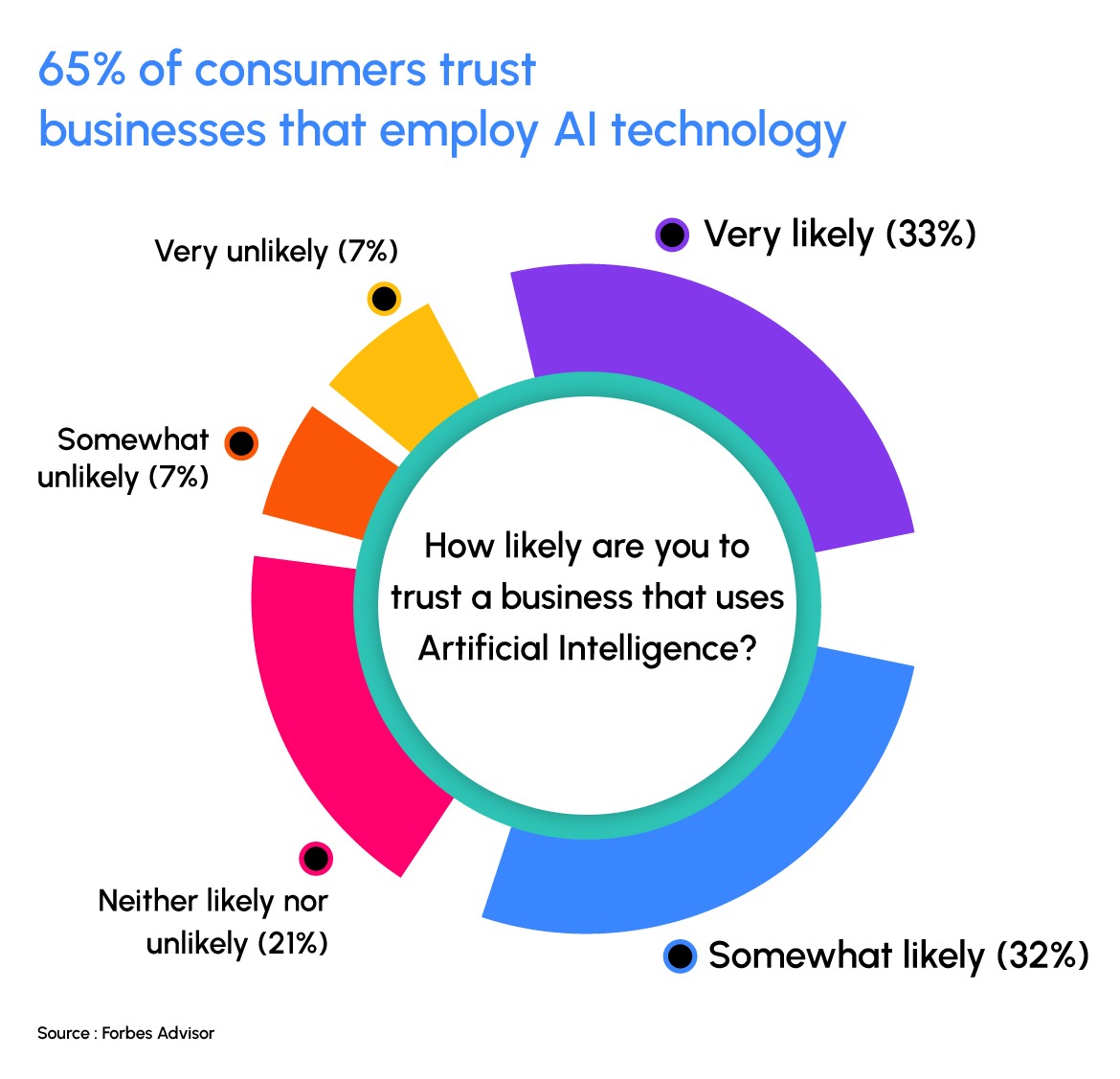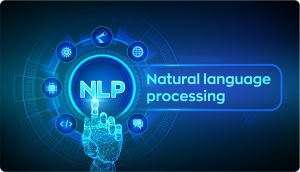
The power of AI lies in its ability to enhance efficiency, engagement, and personalization across various industries. AI is no longer hype but is integral to business processes. In 2023, business leaders have looked at AI with a focus on data security, process automation, and customer service. Natural Language Processing (NLP) is the superstar here, making communication smoother and more efficient.
Gone are the days when website development was a matter of coding and debugging. Now, every website uses AI tools indirectly such as through Google Analytics, SEMRush, or AHrefs – analytical tools powered by AI). Many businesses have started directly incorporating AI for website development such as in personalizing user experience, AI Chatbots, or using AI for increased website security.
According to Grand View Research, the global AI market is projected to experience an annual growth rate of 37% year on year from 2023 to 2030.
The types of websites that should leverage AI web development
A wide range of websites can leverage AI techniques to enhance user experiences, streamline operations, and achieve various objectives. Here are some types of websites that can benefit from including AI in website development:
- E-commerce Websites: No e-commerce website can afford to stay away from AI for website development. AI is essential to provide personalized product recommendations, optimize pricing, and improve search functionality, resulting in increased sales and customer satisfaction.
- News and Content Platforms: AI can help with content recommendations, content generation, and real-time language translation, making news and information more accessible and engaging.
- Educational Websites: AI in web development can personalize learning paths, offer automated grading, and provide intelligent tutoring systems to enhance the learning experience.
- Healthcare Portals: AI can assist with document processing, patient data analysis, and telemedicine services, improving healthcare accessibility and quality.
- Financial Services Websites: AI can be used for fraud detection, risk assessment, and personalized financial advice, enhancing security and user financial well-being.
- Travel and Booking Websites: AI can offer personalized travel recommendations, optimize pricing, and provide real-time language translation to make planning and booking easier.
- Real Estate Platforms: AI can assist with property recommendations, price estimation, and virtual property tours, simplifying the property search process.
- Job Search and Recruitment Websites: AI in web development is a must for every process such as matching job seekers with job openings, automating candidate screening, and providing valuable insights to job seekers and employers.
- Government and Civic Websites: AI can improve citizen services through chatbots, data analysis for policy-making, and enhancing accessibility for differently-abled individuals.
These are just a few examples, but the versatility of AI means it can be applied to virtually any type of website to enhance user experiences, automate tasks, and deliver valuable insights.

How to Optimize Web Development with AI
AI is unlikely to replace web developers in the near future. The existing technology is not geared towards independently generating entire projects from scratch; rather, its purpose is to augment the work of human programmers and simplify their tasks.
There are numerous ways that AI is transforming the way websites are developed. Here are 3 top ways that are worth exploring.
1. Accelerating Web Development with AI-Powered Rapid Prototyping
Traditionally, designing and prototyping a website could take weeks or even months, involving meticulous manual work. However, AI has introduced a revolutionary approach to rapid prototyping.
The concept of “time is money” is particularly apt in web development. The faster a prototype can be created, the sooner it can be tested, refined, and ultimately launched. AI web design streamlines this process significantly by automating several aspects of prototyping. AI-driven tools like Adobe XD or Zeplin can swiftly generate layout options, create interactive elements, and even conduct usability testing in a fraction of the time it would take using traditional methods.
For instance, a web designer working on an e-commerce site can employ AI tools to generate multiple design variations in a matter of hours, whereas manually crafting these layouts could have taken days or even weeks. Integrating emerging technologies like AI to create websites augments functionality. AI algorithms can analyze user behavior and predict effective design choices, allowing for quicker decision-making and more user-centered prototypes.
AI website design models recognize the best design by analyzing a variety of factors, including past user preferences, data-driven insights, and predefined design rules. When using AI web designs for a website with no previous history, the AI website design guidelines encompass rules for layout, color schemes, typography, and other design elements and effectively create an initial design.
Moreover, AI-enhanced usability testing can rapidly identify and address potential issues, further expediting the development process.
2. Personalizing User Experiences with AI Web Development
Personalizing user experiences during web development involves tailoring a website’s content, layout, and functionality to individual users based on their preferences, behavior, and demographics.
IoT (Internet of Things) technology plays a crucial role in creating personalized user experiences by connecting physical devices to the digital world. This technology enhances the level of personalization that websites can offer. IoT devices often work in conjunction with AI and machine learning algorithms. These algorithms can analyze the data collected by IoT devices to discern patterns and user preferences.
AI augments developers’ work by significantly simplifying the implementation of personalized features. Here’s how:
Data Analysis: AI and web development are an effective combination. AI systems can collect and analyze vast amounts of user data, including browsing history, location, and past interactions. This is a task that would be incredibly time-consuming for developers to do manually.
Pattern Recognition: AI can recognize patterns in user behavior and preferences. For instance, it can identify that a user often clicks on sports-related articles or frequently shops for electronics. Recognizing these patterns is challenging for developers without AI assistance.
Real-Time Recommendations: AI algorithms can generate real-time user recommendations, such as suggesting products, articles, or services based on their current behavior. This dynamic personalization enhances the user experience and can boost conversion rates.
Content Customization: AI can help in customizing content and design elements for individual users. For example, it can adapt the layout, language, or images to match the user’s preferences or cultural background.
A/B Testing: AI can facilitate A/B testing by automatically creating and deploying multiple versions of a web page to different user segments, analyzing the results, and optimizing the user experience over time.
3. Combining AI and website development will improve security
AI plays a significant role in providing cybersecurity to websites by enhancing threat detection, incident response, and overall defense mechanisms.
Here are a few ways AI contributes to website security:
Threat detection – AI-powered systems continuously monitor website traffic and user behavior to identify potential threats and anomalies. These systems can detect patterns associated with various cyberattacks, such as Distributed Denial of Service (DDoS) attacks, SQL injection, or cross-site scripting (XSS). When a threat is detected, the AI can respond quickly to mitigate it, such as blocking malicious IP addresses or preventing unauthorized access.
Behavioral Analysis – AI can establish baselines for user behavior and system operations. When a user or system deviates from these norms, AI systems can detect suspicious activity and trigger alerts. For example, if an authorized user suddenly attempts to access sensitive data they shouldn’t have access to, AI can raise a red flag.
Malware Detection – AI-driven malware detection systems scan for malicious code, scripts, or files that may have been injected into a website. These systems can identify and remove malware, protecting both the website and its visitors.
Fraud Prevention – AI can detect fraudulent activities such as identity theft, unauthorized financial transactions, or fake user accounts by analyzing user behavior and transaction patterns.
User Authentication and Access Control: AI can enhance user authentication through biometric or behavioral analysis, making it more difficult for unauthorized users to gain access to sensitive information.
Artificial intelligence is engineered to craft data-driven solutions, but on a scale that surpasses human capabilities. AI enables us to accomplish tasks previously unattainable and optimizes existing processes, freeing humans to concentrate on areas where AI still lags in performance.
iTech is an AI and web development company that is ISO 27701 and SOC 2 certified. Talk to us today to know how our solutions can help you.

Biju Narayanan
Biju is an emphatic people management leader and works by the vision that change is the door to new opportunities and innovation. As Director, he has been guiding iTech on a path of innovation for over 19 years. iTech is a full-service custom software company with a large portfolio of successful domestic and international projects including Fortune 500 organizations. Biju specializes in the healthcare, sports and logistics industries with particular focus on AI and ML. Outside of work, you may find him hitting a lethal jump smash on the badminton court and he is also a creative artist.









